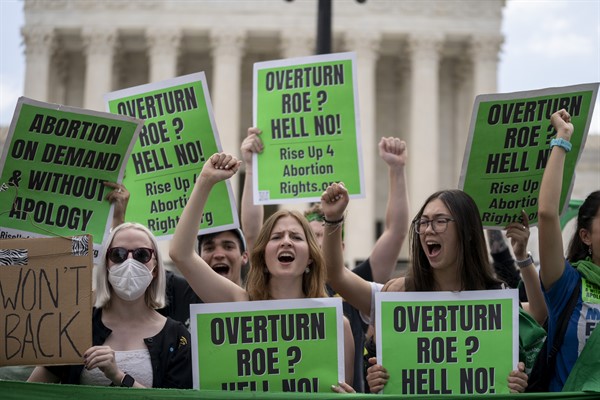This omission is especially noteworthy because, as summarized by the Center for Reproductive Rights—which filed the Dobbs case on behalf of Jackson Women’s Health, a Mississippi abortion provider—a series of amicus curaie briefs submitted to the court specifically invoked U.S. obligations under international human rights treaty law in their arguments in favor of reproductive freedom. One brief, submitted by a group of U.N. mandate holders—including the U.N. rapporteurs on discrimination against women and girls, protection from torture and the right to health—argued that overturning Roe v. Wade would put the U.S. in breach of its international human rights obligations. In another brief, a group of international human rights organizations reaffirmed these obligations and documented how women’s rights to life and health around the world are affected by whether or not countries comply with them. And a brief submitted by a group of international lawyers argued that the customary practice of states in implementing these laws has been to expand abortion access, not restrict it. Instead of referencing U.S. treaty obligations under Article 6, where binding obligations are spelled out, both the court’s majority and the dissent looked to international custom—what the majority refers to as “international norms”—to make their cases.* For instance, the majority cited a brief by the Charlotte Lozier Institute showing that “the US is one of only seven countries in the world that permit elective abortion past 20 weeks,” a claim that was corroborated by the Washington Post in 2017. In response, dissenters pointed out—also correctly—that the global trend has nonetheless been toward expanding, rather than restricting, abortion access: “More than 50 countries around the world—in Asia, Latin America, Africa, and Europe—have expanded access to abortion in the past 25 years.” Neither argument addresses the fact that, regardless of other countries’ behavior, the U.S. is required under its Constitution to enforce the international treaties it has ratified, rather than delegate this to the states. In this light, it is a puzzle why reproductive justice attorneys did not more forcefully press the court to consider the International Covenant on Civil and Political Rights, or why dissenting justices did not themselves invoke these international human rights treaty provisions in arguing against the ruling. But while this responsibility should not have been simply punted to the states, the obligations under that treaty are shared by the states. This means judges throughout the U.S. remain bound by the substantive dictates of international treaty law, according to Article 6 of the Constitution. As such, they are required to consider the International Covenant on Civil and Political Rights’ language in relation to the rights to privacy, freedom from involuntary servitude and forced labor, liberty and security of person. In what scholars sometimes refer to as a “boomerang effect,” human rights activists around the world have often drawn support from the international community and international networks for domestic human rights reforms by appealing to international law and standards. Perhaps abortion rights activists and legal defenders in the U.S. should consider doing the same. *Editor’s note: The original version of this article stated that Article 4, Clause 2 of the U.S. Constitution made treaties signed by the United States the supreme law of the land. It was Article 6. WPR regrets the error.A woman’s right to privacy is already protected by the U.S. Constitution, because it is enumerated in a treaty the U.S. has signed and ratified, making it the law of the land.
Charli Carpenter is a professor of political science and legal studies at University of Massachusetts-Amherst, specializing in human security and international law. She tweets at @charlicarpenter.

